[Part 1 of this series (“Chicago Society’s 1894 Charity Bazaar”) describes the organization of a novel society fundraiser called “Echoes of the White City” in Chicago during the fall of 1894, and Part 2 (“A Midway in Miniature”) and Part 3 (“Fourteen Villages and a Jail”) described the attractions and events of the Midway bazaar. Part 4 (“Heard No More”) details the special days of the bazaar and its closure.]
“What is history? An echo of the past in the future; a reflex from the future on the past.”
—Victor Hugo
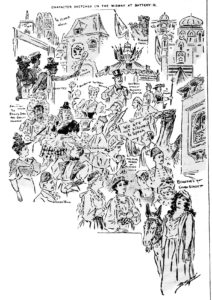
The cast members of “Echoes of the White City” were “All Devoted to Charity.” [Image from the Chicago Herald, Nov. 18, 1894, illustrated by W. W. Denslow.]
Half a dozen other cities in Illinois also developed the idea of erecting miniature Midways, and delegates actively pursued Mrs. Pond-Pope for advice on repeating her success in their towns. Meanwhile, Chicago society toasted Matilda B. Carse for her creative and successful fund-raiser and nostalgic celebration of the 1893 World’s Columbian Exposition. The idea for reviving the Midway Plaisance, however, had not originated with her.
In fact, Midway-themed charity bazaars and fairs were a trend sweeping across America throughout 1894 and beyond. Echoes of the White City could be heard from coast to coast.
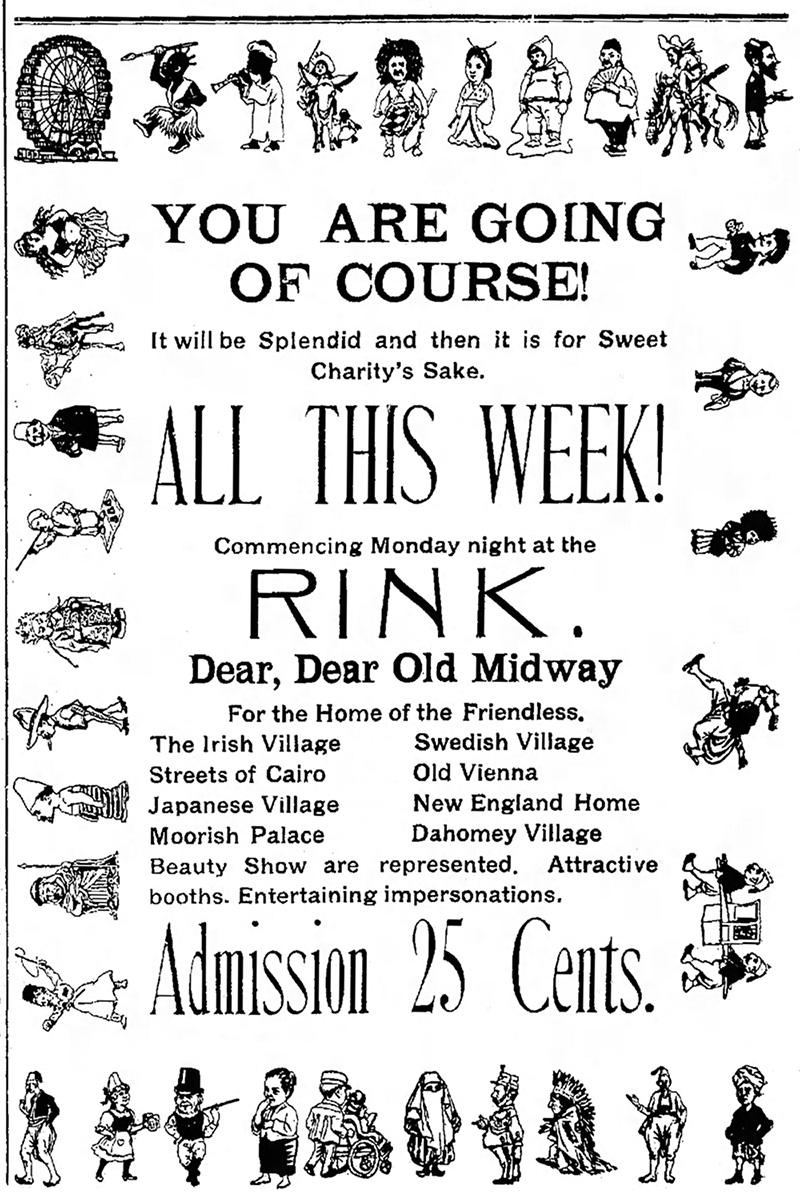
“Dear, Dear Old Midway” was the attraction in Logansport, Indiana, in December of 1894. [Image from the Logansport Pharos Tribune, Dec. 16, 1894.]
Echoes of the White City heard across America
As early as January of 1894, the Cincinnati Cavalry Club had sponsored a Midway show in their city. A forty-foot-wide miniature Midway ran the length of Music Hall, with booths for a German Village, Old Vienna, Japanese Village, Indian Village, Irish Village, Congress of Beauty, Turkish and Chinese theaters, Dahomey Village, Moorish Palace, and a Street in Cairo exhibit. As in Chicago, local society folk and performers played the roles for the various international villagers.
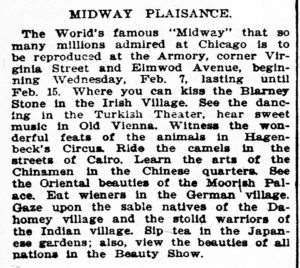
A description of the Midway Plaisance erected in Buffalo, New York, in February of 1894. [Image from The Buffalo Enquirer, Feb. 5, 1894.]
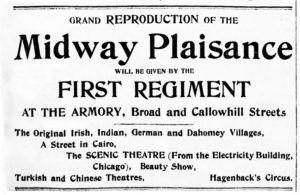
An advertisement for the traveling Midway Plaisance reproduction when it visited Philadelphia in February of 1894. [Image from The Times (Philadelphia), Feb. 18, 1894.]
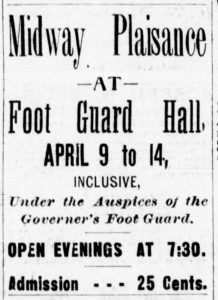
The traveling Midway arrived in Hartford, Connecticut, in early April 1894. [Image from the Hartford Courant, Apr. 10, 1894.]
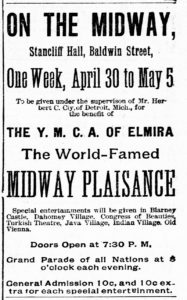
The Midway show from Detroit raised $700 to support the Y.M.C.A in Elmira, New York. [Image from the Star Gazette, Apr. 24, 1894.]
Geometrical gyrations and the bold, bad barkers
Smaller Midway bazaars were mounted in Detroit at the Holy Trinity Church in early February, and at the Our Lady of Help parish school a month later. Greenfield, Indiana, erected one in March. In May, one year after the Columbian Exposition had opened in Chicago, the Washington Artillery Hall in New Orleans held a grand Midway Plaisance.
The State Naval Reserve hosted a Midway fair in Old City Hall in Pittsburgh starting on May 1. (The touring Midway from Detroit was in Elmira, New York, at this time, so the Pittsburgh show appears to be an independent venture.) The Pittsburgh Press reported that the “geometrical gyrations and the bold, bad barkers” made this fair “one of the funniest and best things of the kind that the city ever had within its limits.”
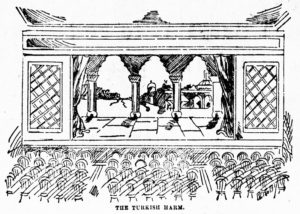
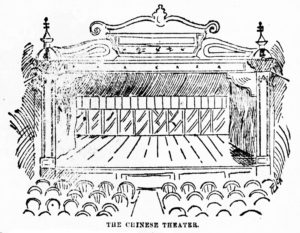
The Turkish Theater (top) and the Chinese Theater (bottom) stages at the Pittsburgh Midway show. [Images from the Pittsburgh Press, May 5, 1894.]
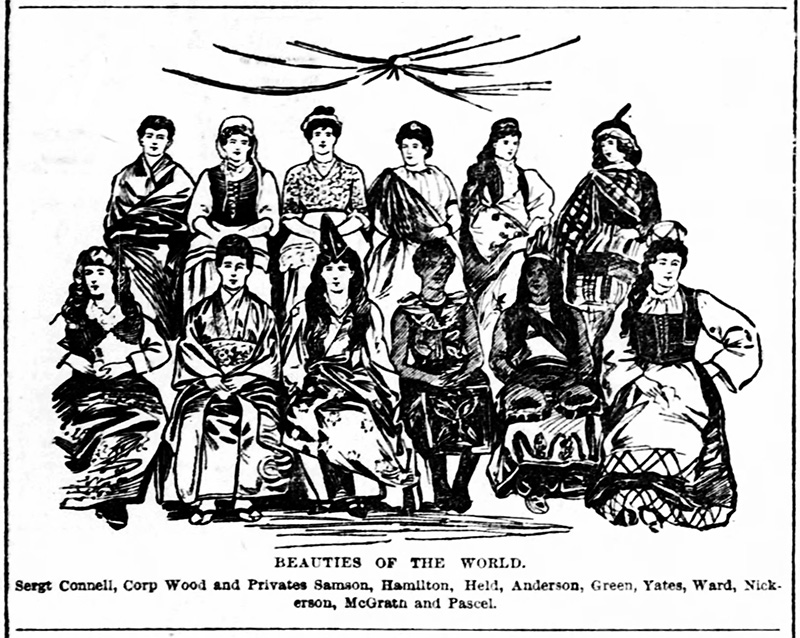
As in Chicago, the “International Congress of Beauty” at the Midway fair in Boston (and other cities) featured men performing in drag as the attraction. [Image from the Boston Globe, Apr. 1, 1894.]
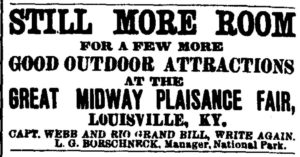
A call for more attractions to fill the Midway Plaisance Fair popping up in Louisville, Kentucky. [Image from the New York Clipper, Aug. 25, 1894.]
Freak, fairies, foreigners and other features
A Midway that sprang to life during the summer at Black Hawk’s Watch Tower in Davenport, Iowa, drew 8,000 people in one day. A Midway Plaisance was constructed in June in Connersville, Indiana; in August at the Tri-State Fairgrounds Toledo, Ohio; in October at a YMCA in Pottsville, Pennsylvania; and in December in Oil City, Pennsylvania. Logansport, Indiana, also held their Midway in December, while the one in Lexington, Kentucky, popped up in January of 1895.
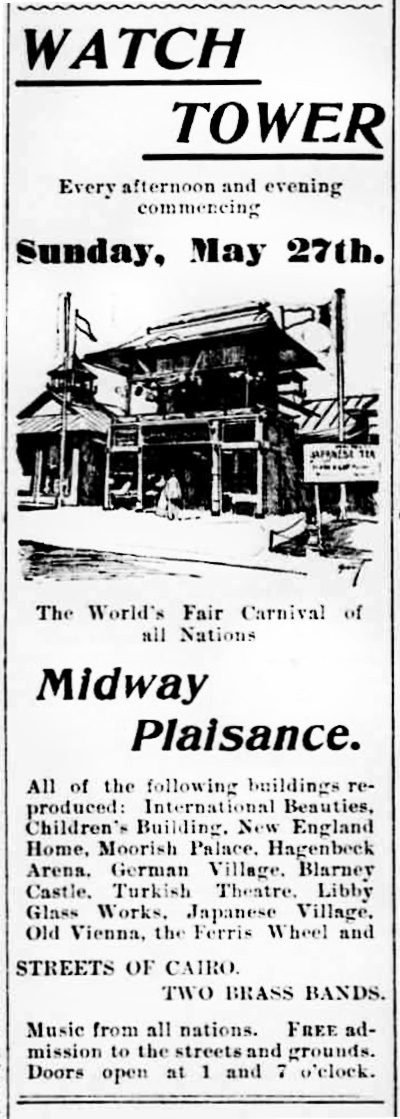
Watch Tower in Davenport, Iowa, hosted a Midway Plaisance Fair with a “Carnival of All Nations” during the summer of 1894. [Image from the Rock Island Argus, May 28, 1894.]
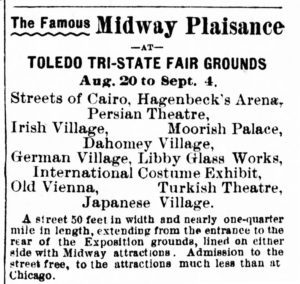
Advertisement for a Midway show in Toledo, Ohio, that promised many of the same attractions that had been in Chicago in 1893, but at a much lower price of admission. [Image from the Democratic Northwest and Henry County News (Napoleon, OH), Aug. 16, 1894.]
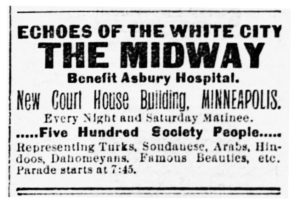
In June of 1895, Minneapolis society came out for a Midway bazaar also called “Echoes of the White City—The Midway.” [Image from the St. Paul Globe, June 1, 1895.]
Legacy of the Midway
Even though the name originated with a six-hundred-foot wide by one-mile-long strip of land connecting two Chicago parks, “The “Midway” is forever remembered as an event. Following the Columbian Exposition, many of the attractions moved intact to the 1894 “Midwinter Fair” in San Francisco before becoming a standard presence at World’s Fairs for years to come.
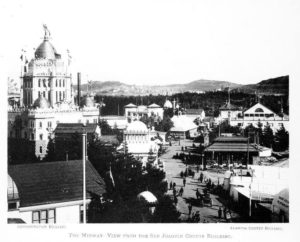
The Midway Plaisance at the 1894 Midwinter Fair in San Francisco’s Golden Gate Park. [Image from the Library of Congress.]
In the months after the close of the World’s Columbian Exposition, the structures of the White City succumbed to dismantling and destruction. Midway fairs that popped up around the country offered thousands of Americans who were not able to make the trip to Chicago in 1893 a taste of the Midway Plaisance—or at least imitations and offshoots of its international villages and attractions. Others who attended these bazaars could relive their time exploring the polyglot settlements on the Plaisance in Chicago one more time.
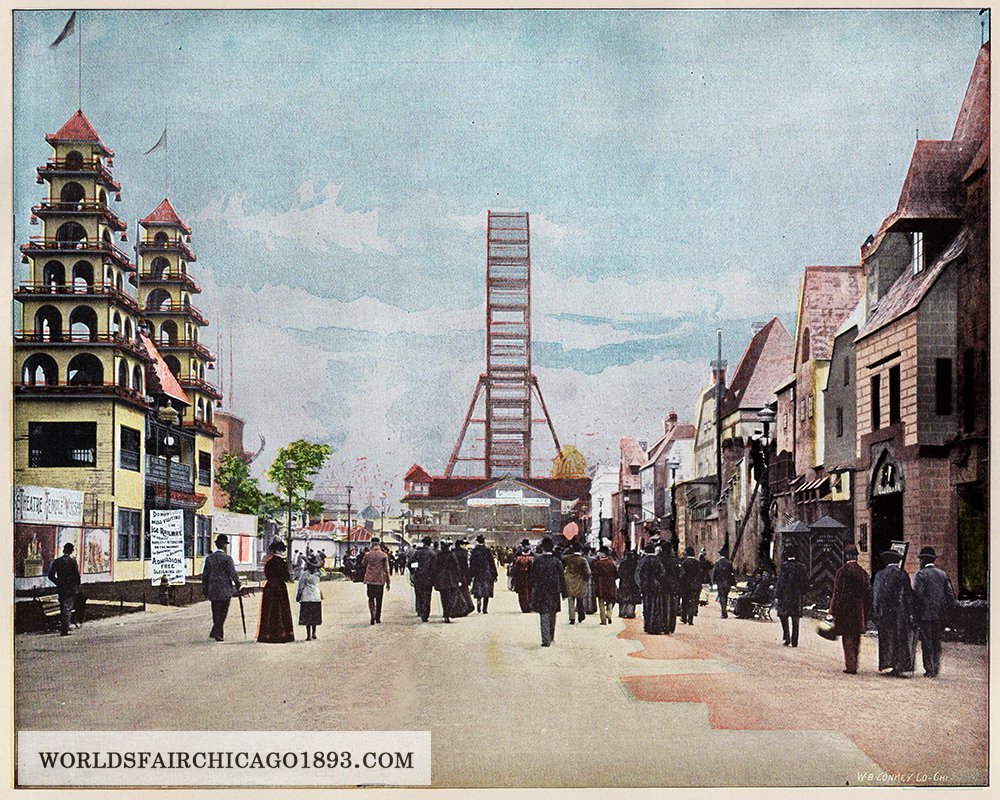
SOURCES
advertisement Logansport (IN) Pharos Tribune, Dec. 16, 1894, p. 5.
“An Enjoyable Evening” Miners Journal (Pottsville, PA), Oct. 11, 1894, p. 1.
Comstock-Skipp, Jaimee K. “From the World’s Fair to Disneyland: Pavilions as Temples” Open Arts Journal 2, Winter 2013–2014.
“Crowds in the City” Rock Island Argus, May 28, 1894, p. 5.
Detroit Free Press Mar. 19, 1894, p. 5.
“For the Big Show” Boston Post Mar. 26, 1894, p. 2.
“Fun at the Tower” Morning Democrat (Davenport, IA), Mar. 27, 1894, p. 4.
“In Boston’s Midway” Boston Globe, Apr. 1, 1894, p. 28.
“In Full Blast” Morning Journal Courier (New Haven, CT), Mar. 30, 1894, p. 2.
“Gates of Midway Closed” Albuquerque Journal, May 10, 1895, p. 4.
“The Gayety of Nations” Rushville (IN) Republican, Jun. 15, 1894, p. 4.
Gilfoyle, Timothy J. “White Cities, Linguistic Turns, and Disneylands: The New Paradigms of Urban History” Reviews in American History, 6 (March 1998), 175-204.
“A House Warming” Star Tribune (Minneapolis), May 5, 1895, p. 4.
“How Coup Won Fame” Chicago Inter Ocean, Mar. 8, 1895, p. 10.
“Lexington’s Midway” Cincinnati Enquirer, Jan. 27, 1895, p. 17.
“Local and Personal” Greenfield (IN) Republican, Mar. 1 1894, p. 1.
“The Midway” Cincinnati Enquirer Jan. 6, 1894, p. 5.
“The ‘Midway’ at Home” Hartford (CT) Courant, Apr. 5, 1894, p. 4.
“Midway in Our Midst” Boston Post Feb. 25, 1894, p. 4.
“Midway Once More” Decatur (IL) Herald Dec. 5, 1894, p. 3.
“The Midway Opened” Hartford (CT) Courant, Apr. 10, 1894, p. 3.
“Midway Plaisance” Morning Journal Courier (New Haven, CT), Jan. 11, 1894, p. 2.
“The Midway Plaisance” Times (Philadelphia) Feb. 20, 1894 p. 2.
“The Midway Plaisance” Buffalo Enquirer, Jan. 31, 1894, p. 6.
“Midway Plaisance” Daily Review (Decatur, IL), Nov. 21, 1894, p. 8.
“Midway Plaisance Next Week” Decatur (IL) Herald Nov. 29, 1894, p. 4.
“Military and Naval” Boston Globe Feb. 25, 1894, p. 10.
Nelson, Steve “Walt Disney’s EPCOT and the World’s Fair Performance Tradition” The Drama Review: TDR 30, 4 (Winter, 1986), pp. 106-146.
“The Net Profit is $700” Star Gazette (Elmira, NY), May 7, 1894, p. 7.
“Oil City’s Charity Midway” News Herald (Franklin, PA), Dec. 12, 1894. p. 1.
“On the Midway” Detroit Free Press, Feb. 2, 1894, p. 8.
“Once More the Midway” Daily Leader (Davenport, IA), Apr. 2, 1894, p. 4.
“Pittsburgh’s Midway” Pittsburgh Post Gazette, May 1, 1894, p. 4.
“Pittsburgh’s Midway” Pittsburgh Press, May 4, 1894, p. 11.
“The Plaisance at the Armory” Buffalo Evening News, Jan. 31, 1894, p. 25.
“Reviving the Midway” Chicago Inter Ocean Jun. 14, 1894, p. 8.
“Revived the Midway” Chicago Inter Ocean Jun. 17, 1894, p. 8.
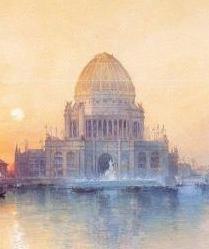
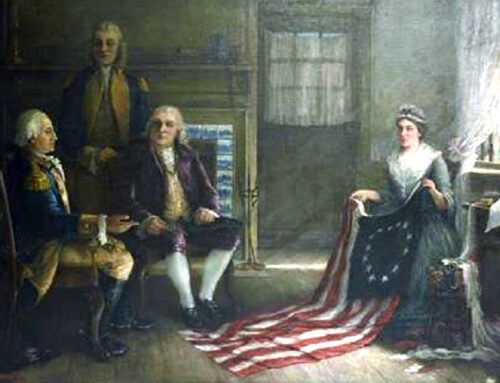
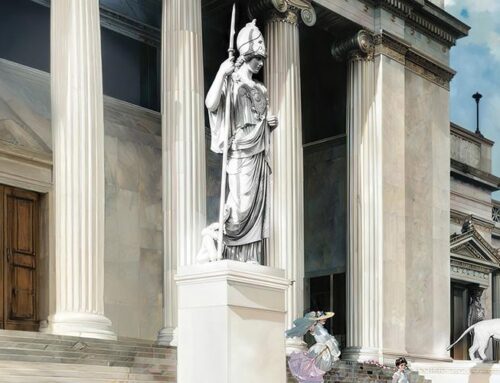
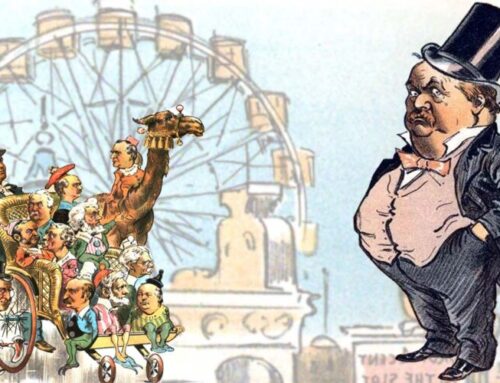
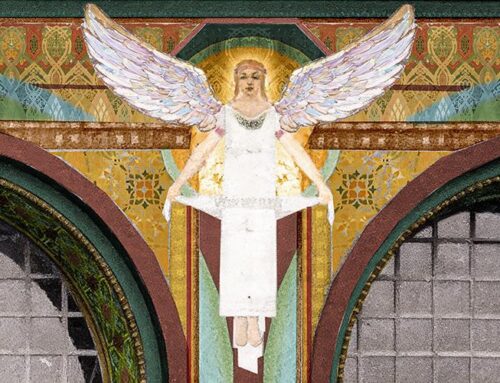
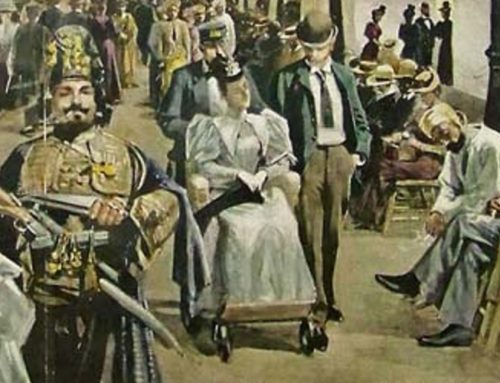
Leave A Comment